Webinar Series: Thinking Global, Educating Local
The webinar series -- Thinking Global, Educating Local -- is intended to serve as professional development for educators who are interested in reducing the ecological footprint of their school and enhancing their school’s engagement with sustainability education.
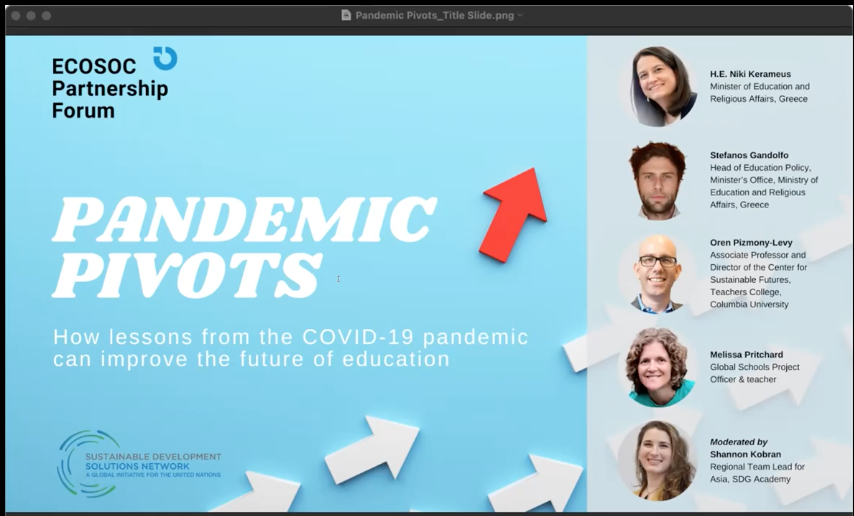
Webinar #25: Pandemic pivots: How lessons from the COVID-19 pandemic can improve the future of education
On January 31, 2023, the UN Sustainable Development Solutions Network hosted “Pandemic pivots: How lessons from the COVID-19 pandemic can improve the future of education" as an official side event of the UN 2023 ECOSOC Partnership Forum.
The COVID-19 pandemic has been a time of enormous upheaval for the sector—and also one of enormous opportunity. The session addressed the pivots that were made in education, from the adoption of digital pedagogies to the greater attention to socio-emotional learning, and the partnerships that were necessary to achieve them. Which of these pivots will stand the test of time? What does the rapid deployment of new techniques, technologies, and partnerships during COVID mean for future educational innovations? And how can this innovative energy be used to advance the goals of SDG 4 and, by extension, all the other SDGs?
The side event brought together representatives of different stakeholder groups within education to share their reflections on these “pandemic pivots” and their hopes for the future in a moderated conversation.
Speakers included:
- H.E. Niki Kerameus, Minister of Education and Religious Affairs, Greece, and
- Stefanos Gandolfo, Head of Education Policy, Minister’s Office, Ministry of Education and Religious Affairs, Greece, representing the policy perspective;
- Professor Oren Pizmony-Levy, Associate Professor and Director of the Center for Sustainable Futures, Teachers College, Columbia University, representing the academic perspective;
- Melissa Pritchard, Global Schools Project Officer and teacher, representing the in-service teacher perspective; and
- Shannon Kobran, Regional Team Lead for Asia, SDG Academy, SDSN (moderator)
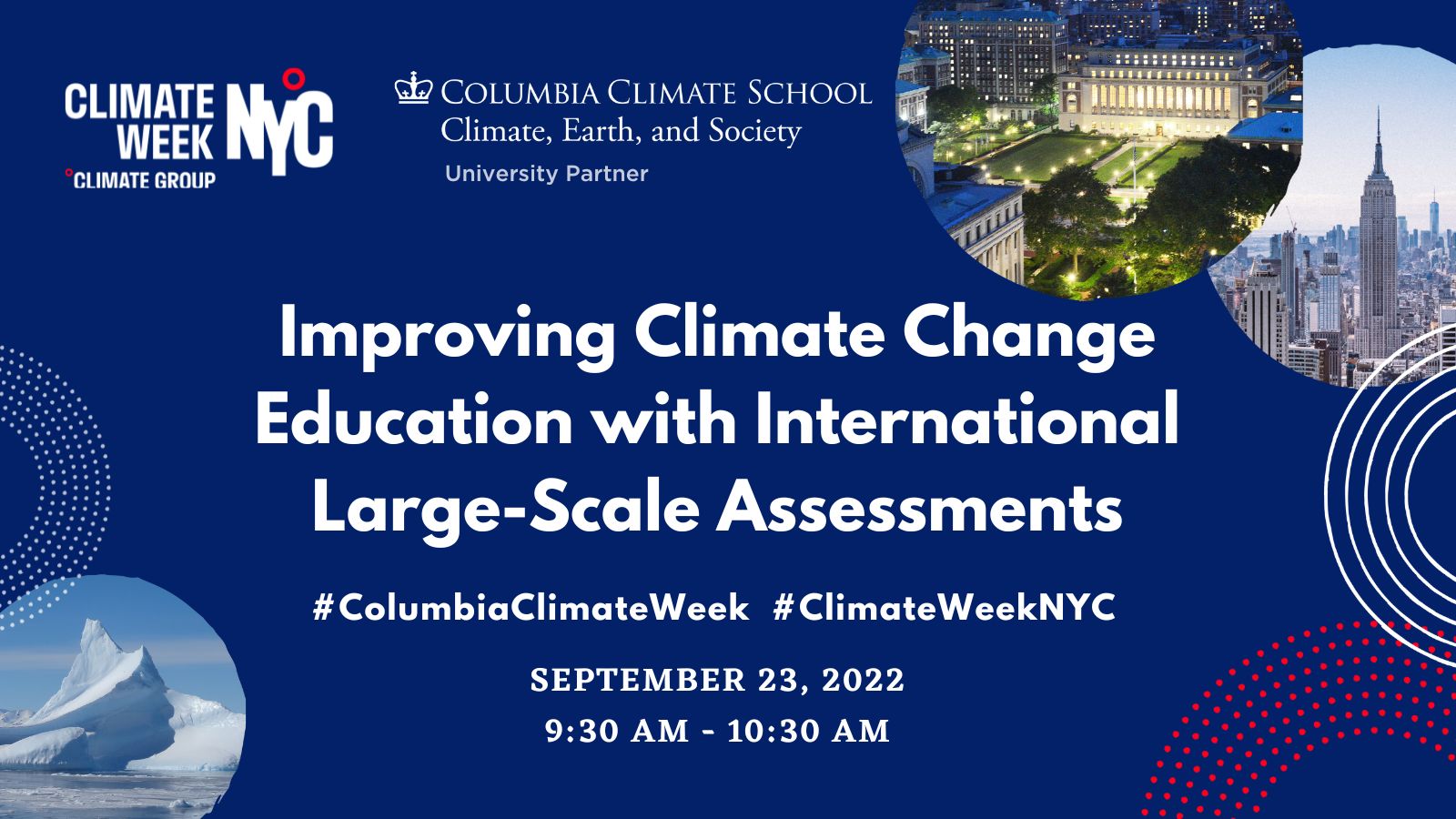
Webinar #24: Improving Climate Change Education with International Large-Scale Assessments
Education is an essential factor in the global fight against climate change. International Large-Scale Assessments (e.g., TIMSS, ICCS, PISA, TALIS) can provide useful information that has the power to guide conversations about and inform efforts to improve climate change education. Join a panel of scholars and practitioners as they discuss their work on incorporating sustainability and climate education across different international assessments.
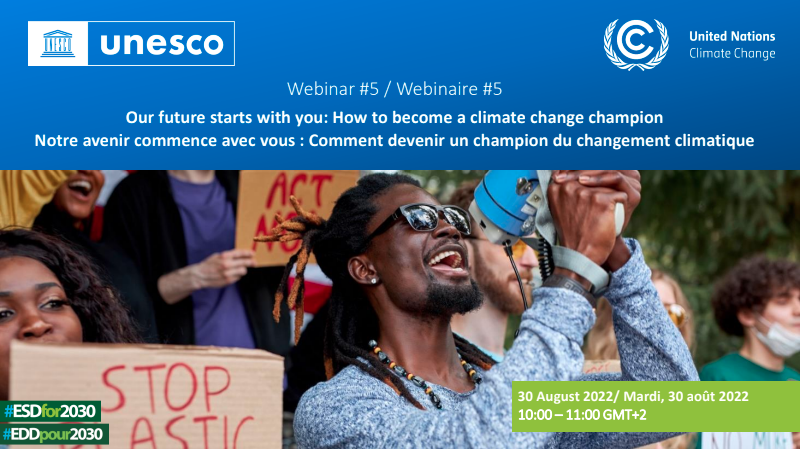
Webinar #23: Our future starts with you - How to become a climate change champion
To respond to the urgent calls for action from young people to ensure every learner is equipped to tackle climate change, UNESCO and UNFCCC launched a series of monthly conversations on climate change education. The series consists of 8 webinars from April to November, on the road to COP27 to be held in Sharm El-Sheikh, Egypt in November 2022. The fifth webinar focused on the idea of learning for change and how education can empower people to take action for the planet. The panel featured two youth activists - Ayshka Najib and Hoor Ahli, and Founding Director of the Center for Sustainable Futures, Oren Pizmony-Levy. They discussed how youth become climate champions and what it means to be a champion and activist, and also outlined how education can be changed to encourage more students to become climate champions.
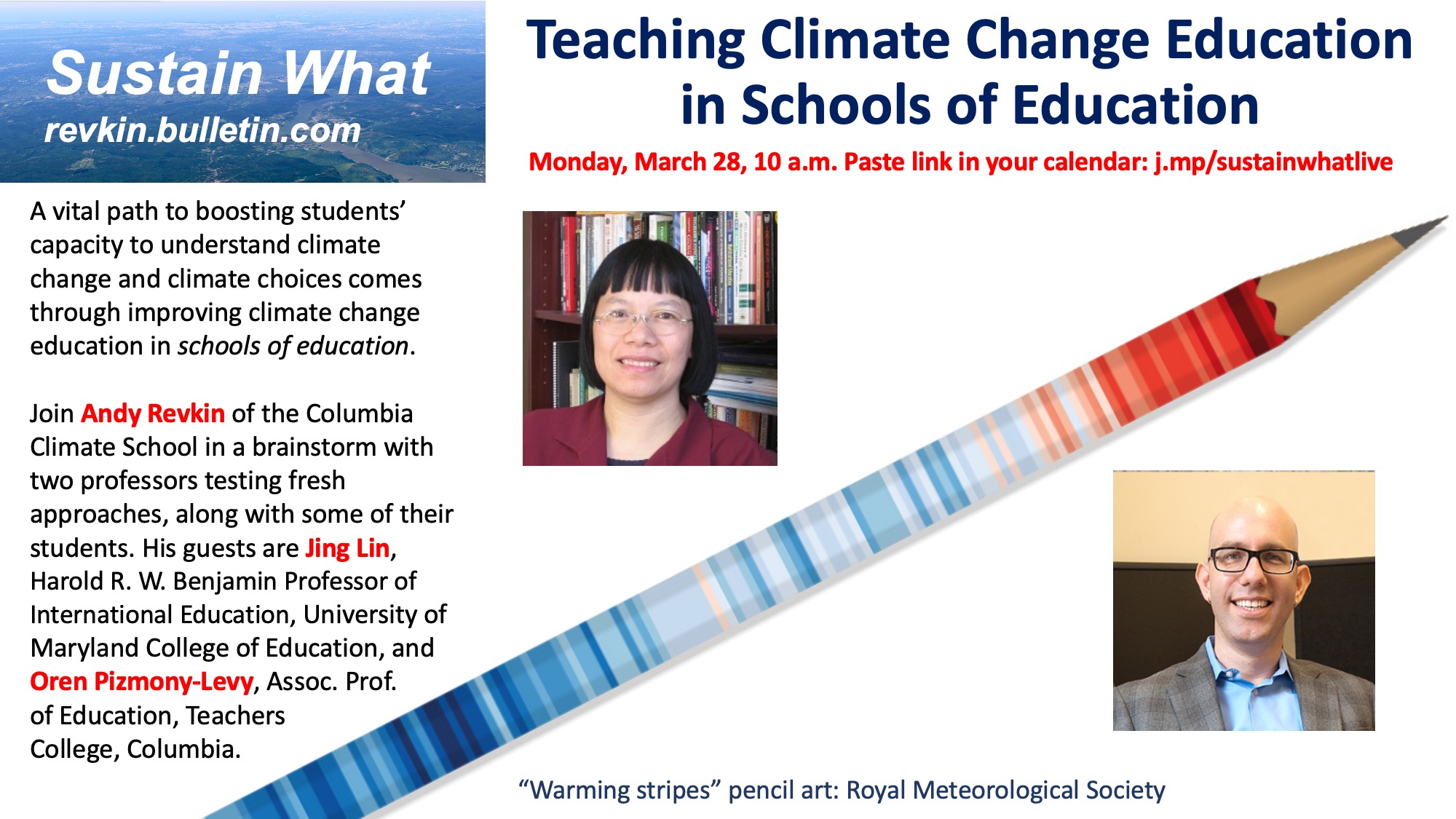
Webinar #22: Teaching Climate Change Education in Schools of Education
One path to boost students’ capacity to understand climate change and climate choices emerges through improving climate change education in schools of education.
Andy Revkin of the Columbia Climate School tested fresh approaches to Climate Change Education, with Professor Jing Lin and Professor Oren Pizmony-Levy along with some of their students. Professor Jing Lin is the Harold R. W. Benjamin Professor of International Education at the University of Maryland College of Education, and Oren Pizmony-Levy is Associate Professor of Education, at Teachers College, Columbia University and director of the Teachers College Initiative for Sustainable Futures, and Co-Director of the New York City Partnership for Sustainability Education.
Oren Pizmony-Levy
https://www.tc.columbia.edu/faculty/op2183/
Jing Lin
https://education.umd.edu/directory/jing-lin
Subscribe to Andy Revkin's Sustain What dispatches and webcasts:
http://j.mp/revkinbulletin
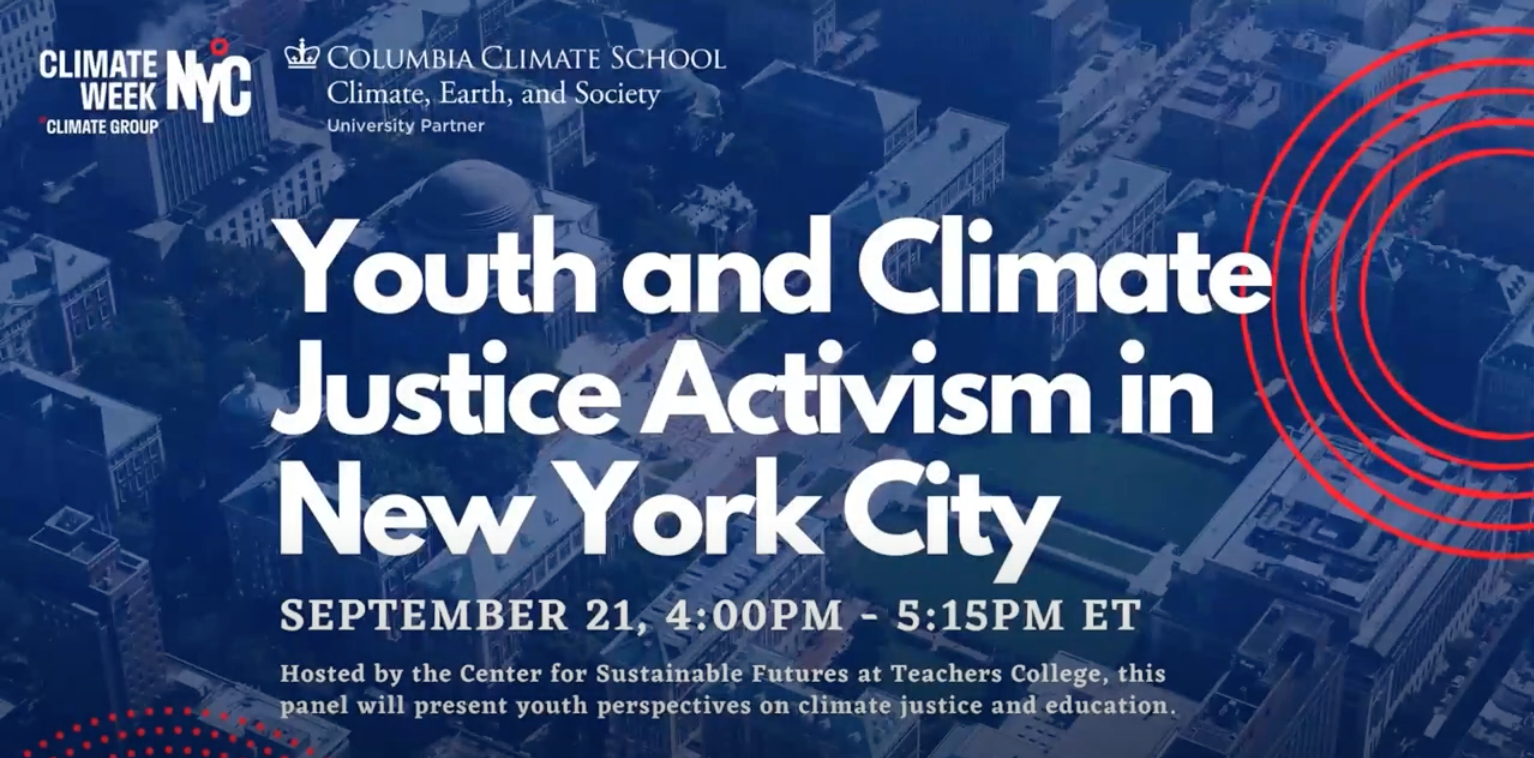
Webinar #21: NYC Climate Week - Youth and Climate Justice Activism in New York City
Youth activists are increasingly taking action and speaking out about their future being under serious threat from the effects of climate change. This panel features scholars, local government leaders, and youth activists. Speakers will examine questions of what motivates youth to mobilize, and what adults can do to support young people at this time. This event will include short presentations and conversation among the panelists, followed by questions from the audience.
Watch Youth and Climate Justice Activism in New York City here
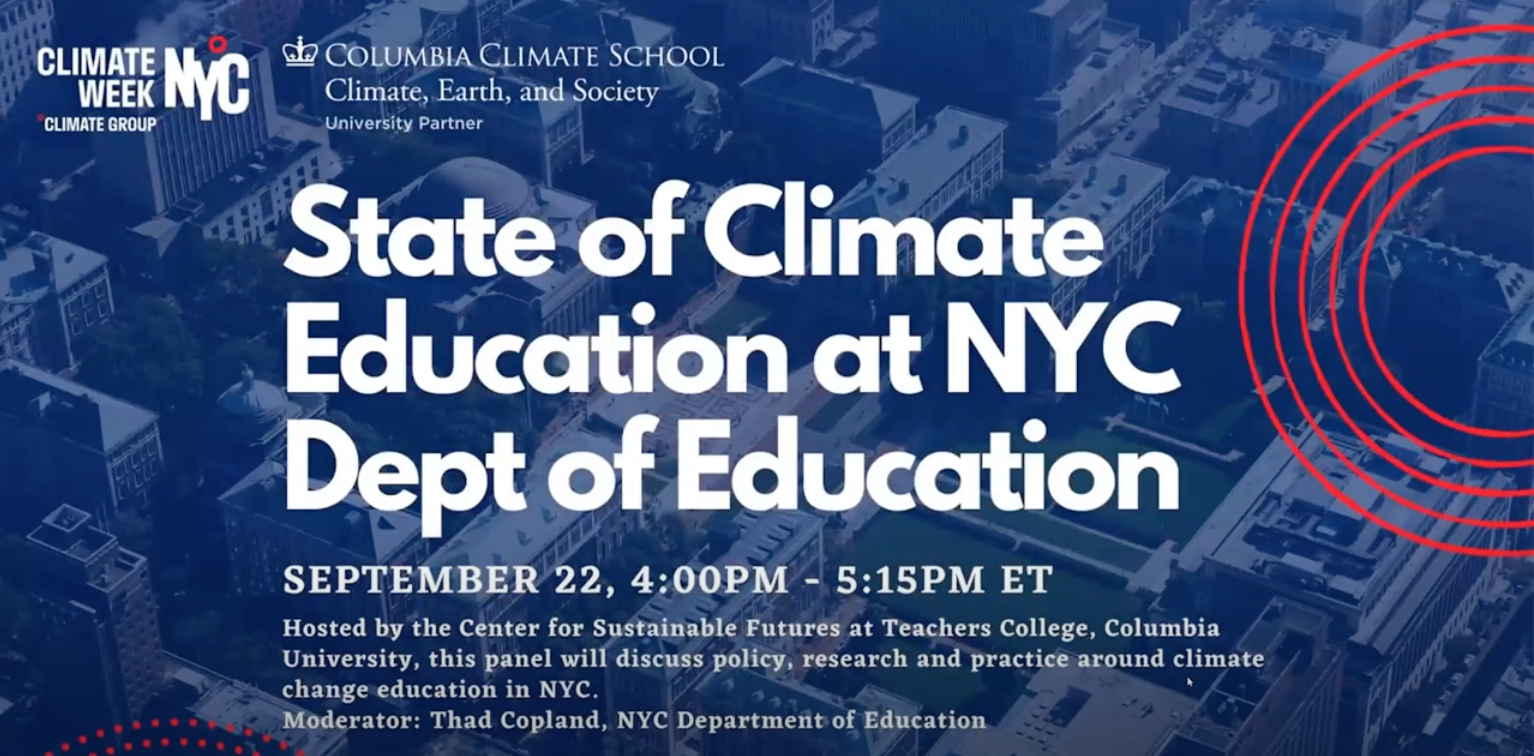
Webinar #20: NYC Clime Week - State of Climate Education at NYC Department of Education
Education is an essential factor in the global fight against climate change. Join a panel of researchers, local government leaders and educators as they discuss their work on improving climate change education in NYC public schools.
Watch State of Climate Education at NYC Department of Education here
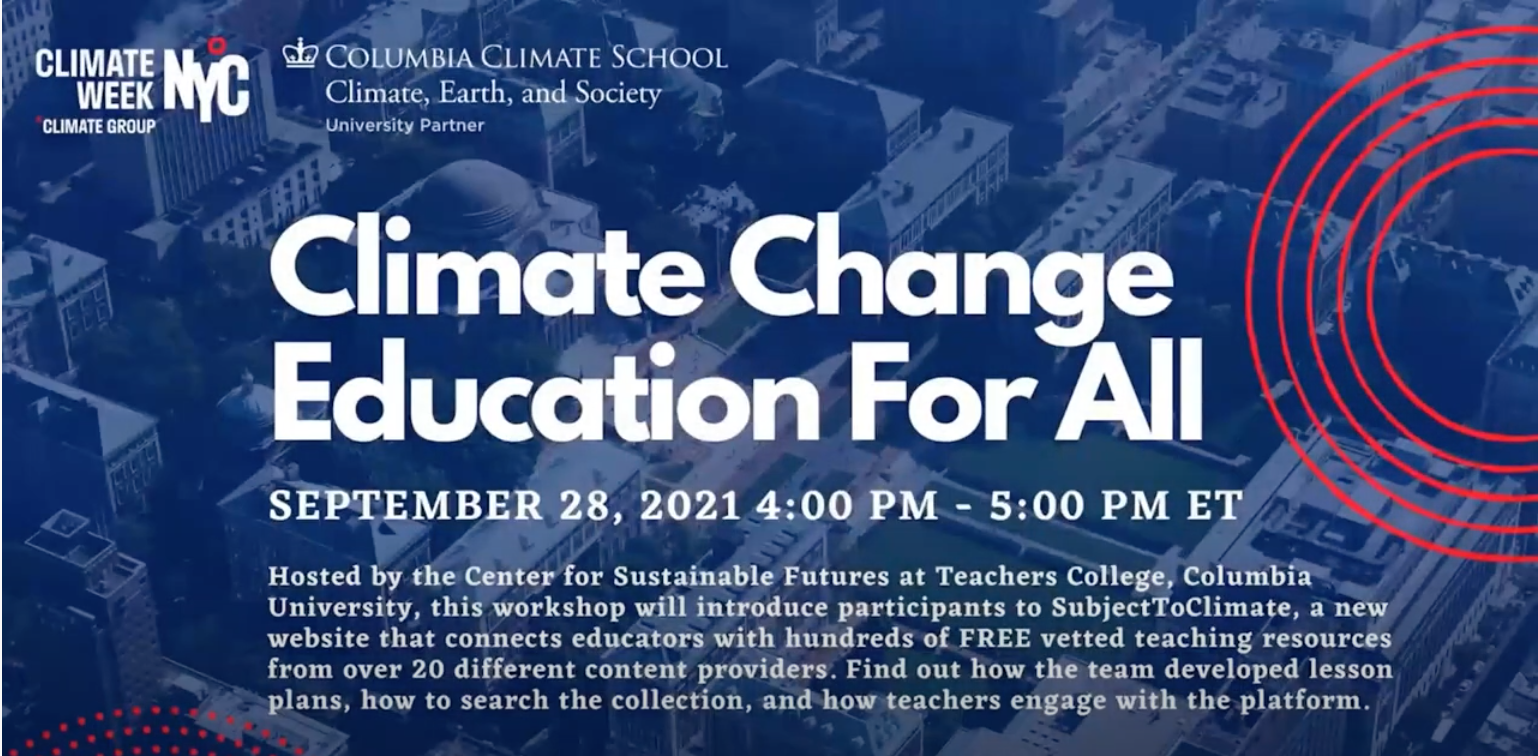
Webinar #19: NYC Climate Week - Climate Change Education for All
Hosted by the Center for Sustainable Futures at Teachers College, Columbia University, this workshop will introduce participants to SubjectToClimate, a new website that connects educators with hundreds of FREE vetted teaching resources from over 20 different content providers. Find out how the team developed lesson plans, how to search the collection, and how teachers engage with the platform.
The Climate Group has selected the Columbia Climate School as its university partner for this year’s Climate Week NYC. Running Sept. 20-26, Climate Week NYC convenes key climate leaders to accelerate climate action and discuss ambitious commitments ahead of the 26th UN Climate Change Conference, or COP26, later this fall in Glasgow.
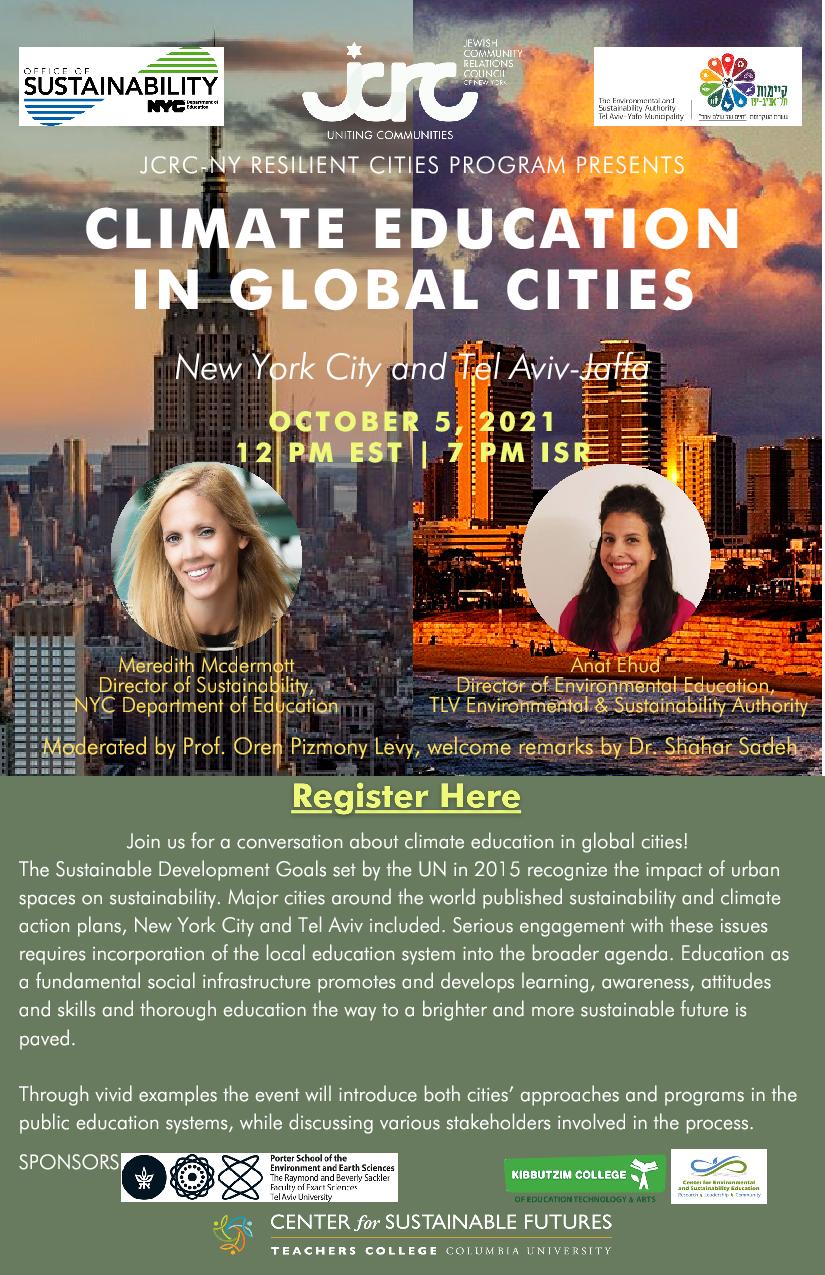
Webinar #18: Climate Education in Global Cities – New York City and Tel Aviv-Jaffa
The Sustainable Development Goals set by the UN in 2015 recognize the impact of urban spaces on sustainability. Major cities around the world published sustainability and climate action plans, New York City and Tel Aviv included. Serious engagement with these issues requires incorporation of the local education system into the broader agenda. Education as a fundamental social infrastructure promotes and develops learning, awareness, attitudes and skills. Through education, the way to a brighter and more sustainable future is paved. At this event, policymakers from two global cities introduced their cities' approaches and programs in the public education systems, while discussing various stakeholders involved in the process. Our speakers included Dr. Shahar Sade from the Jewish Community Relations Council of New York, Meredith McDermott from the Office of Sustainability at the New York City Department of Education, and Anat Ehud from the Environmental and Sustainability Authority of Tel Aviv-Jaffa. TC Faculty Member and Founding Director of the Center for Sustainable Futures, Oren Pizmony-Levy, moderated the discussion.
Webinar: Climate Education in Global Cities – New York City and Tel Aviv-Jaffa
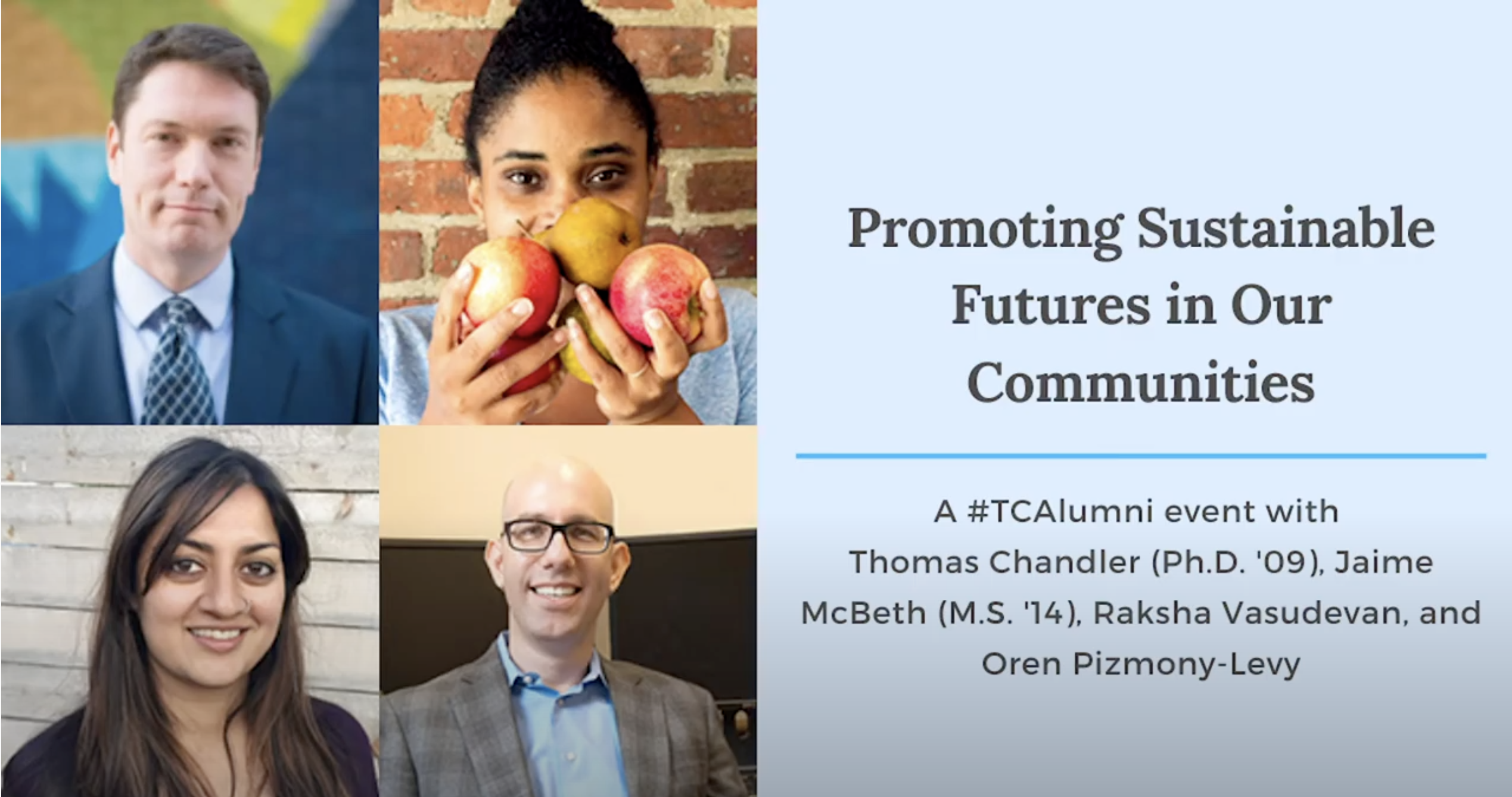
Webinar #16: Promoting Sustainable Futures in Our Communities
Webinar: Promoting Sustainable Futures in Our Communities
Download the Promoting Sustainable Futures in Our Communities Resource Guide
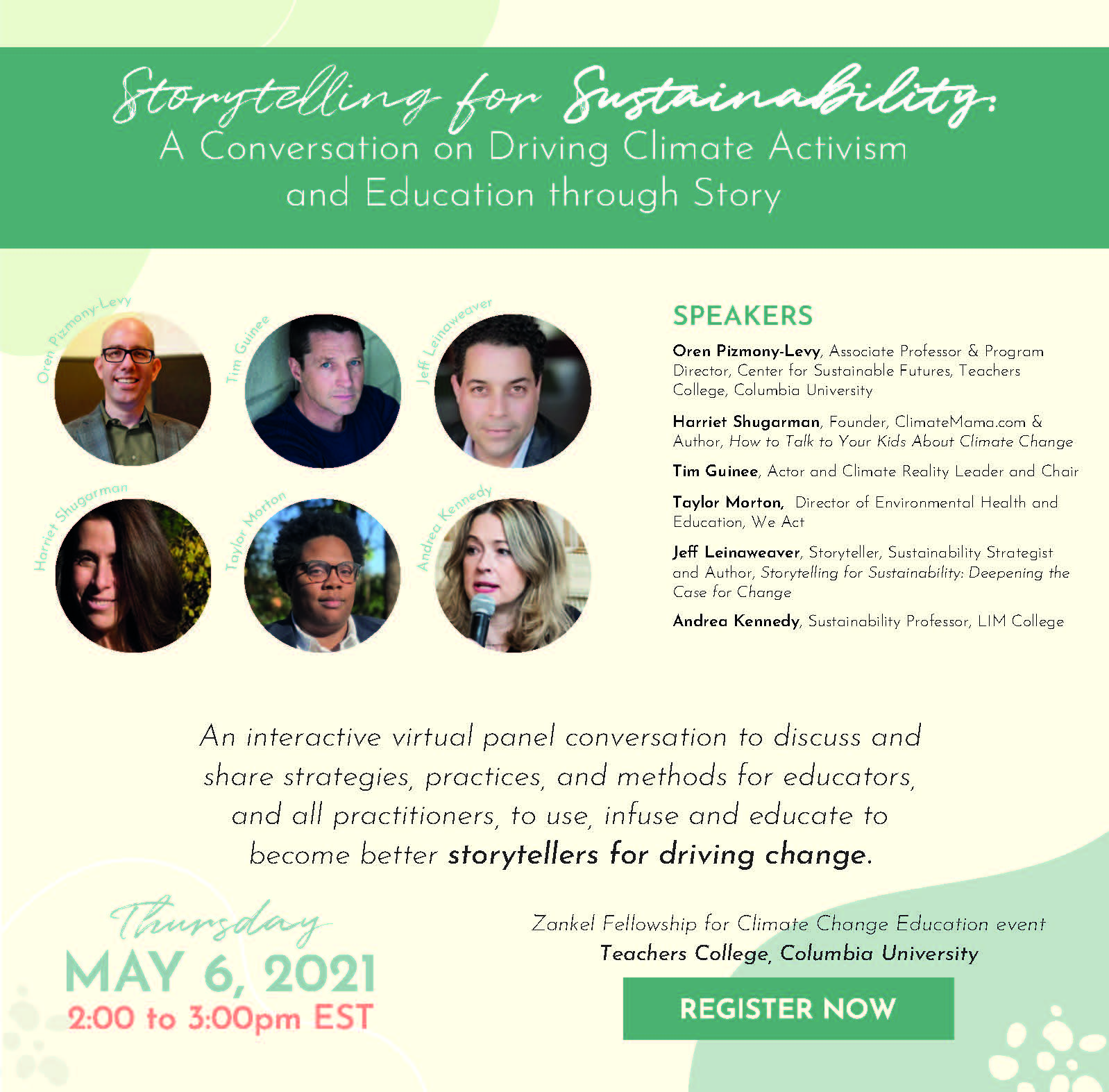
Webinar #15: Climate Activism and Education through Storytelling
Oren Pizmony-Levy, Associate Professor & Program Director, Center for Sustainable Futures, Teachers College, Columbia University
Harriet Shugarman, Founder, ClimateMama.com & Author, How to Talk to Your Kids About Climate Change
Tim Guinee, Actor and Climate Reality Leader and Chair
Taylor Morton, Director of Environmental Health and Education, We Act
Jeff Leinaweaver, Storyteller, Sustainability Strategist and Author, Storytelling for Sustainability: Deepening the Case for Change
Andrea Kennedy, Sustainability Professor, LIM College
Webinar: Climate Activism and Education through Storytelling
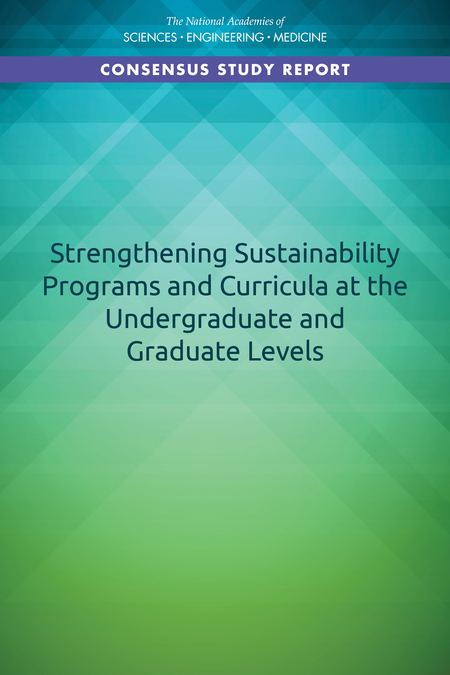
Webinar #14: Strengthening Sustainability Education in Colleges and Universities
Webinar: Strengthening Sustainability Education in Colleges and Universities
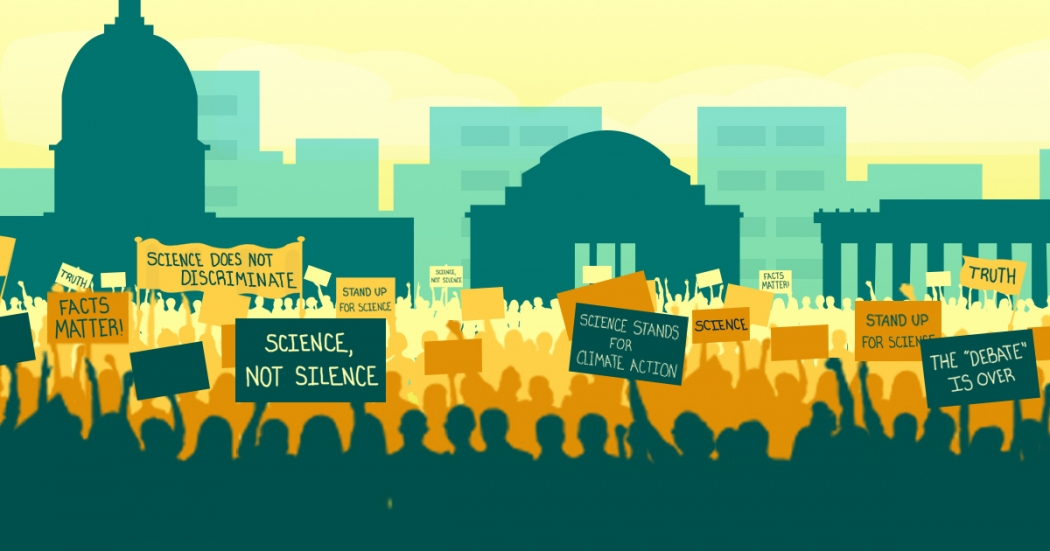
Webinar #13: Engaging Youth Climate Activists
Webinar: Engaging Youth Climate Activists
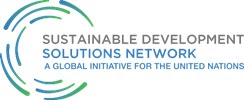
Webinar #12: Education for Sustainable Development
The Challenges and Opportunities of Curriculum Localization in Morocco, Ghana, and Turkey
Webinar: Education for Sustainable
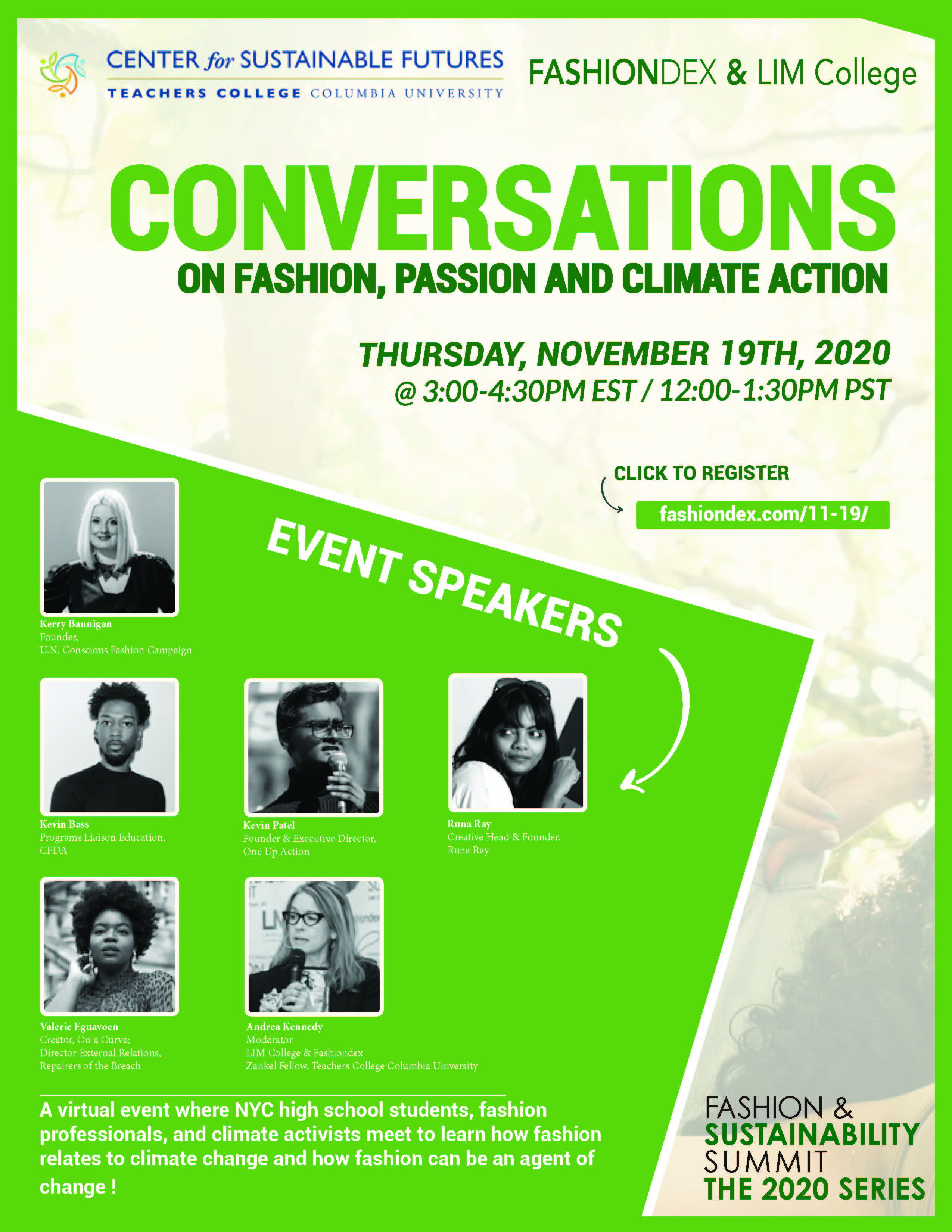
Webinar #11: Conversations on Fashion, Passion and Climate Action
Webinar: Conversations on Fashion, Passion and Climate Action
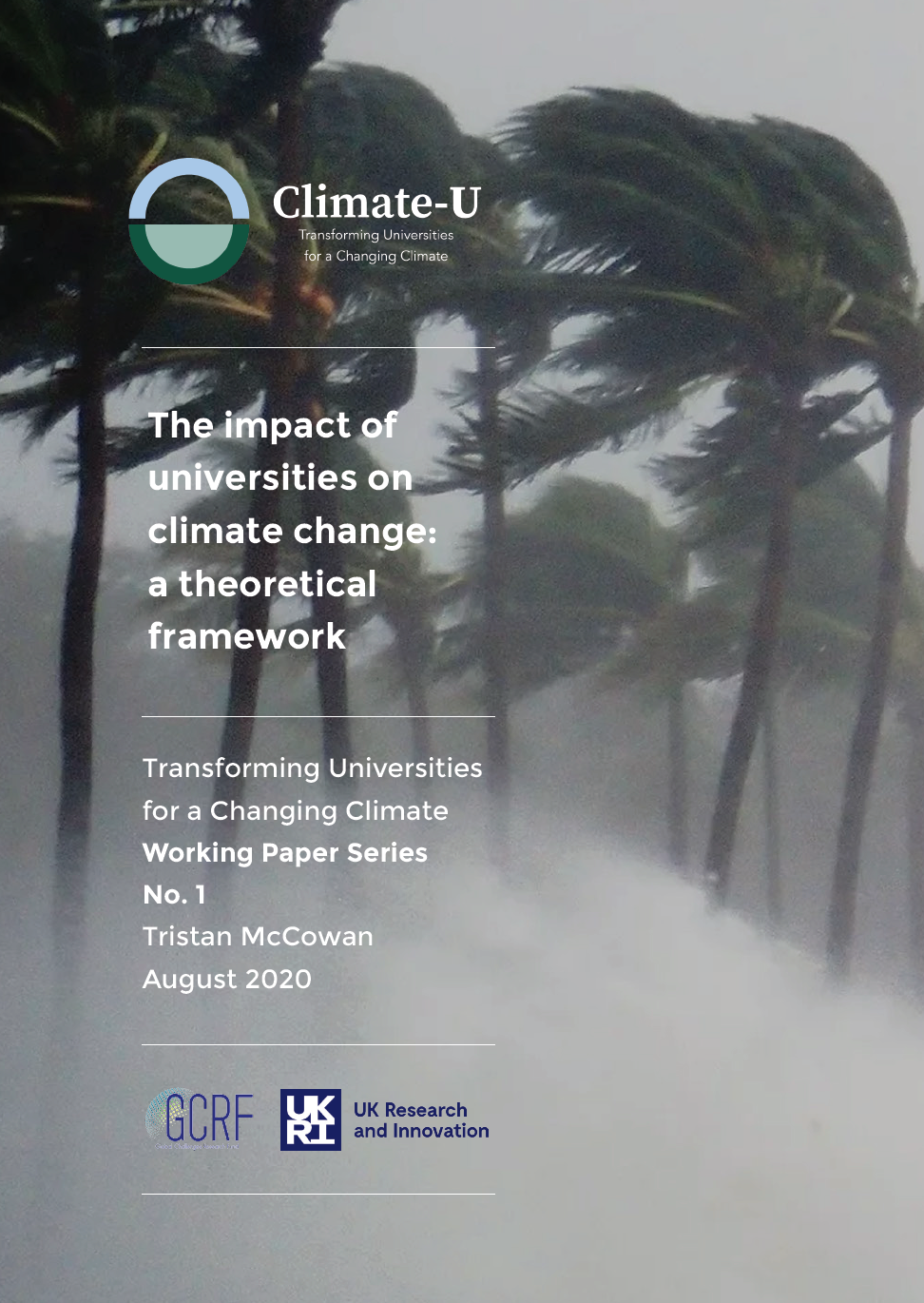
Webinar #10: The Impact of Universities on Climate Change
Universities have a crucial role to play in addressing climate change, but the complex and multifaceted nature of the issue presents challenges for the traditional functioning of the institution. While there is a growing body of work on campus sustainability and climate issues in the curriculum, there is a need to understand more holistically the forms of influence that universities have on society and the environment. This paper puts forward a framework for understanding the impact of universities on climate change, involving four stages: the modalities of university action (education, knowledge production, public engagement, service delivery and campus operations); direct engagement with bridging actors; the broader influence on societal understandings and practices; and finally impact on the ecosphere. Specific pathways of impact are identified, involving either mitigation of or adaptation to climate change. This framework serves as an analytical tool to identify the trajectories of impact already in evidence, but also presents normative implications for the role of higher education institutions in addressing the current climate crisis.
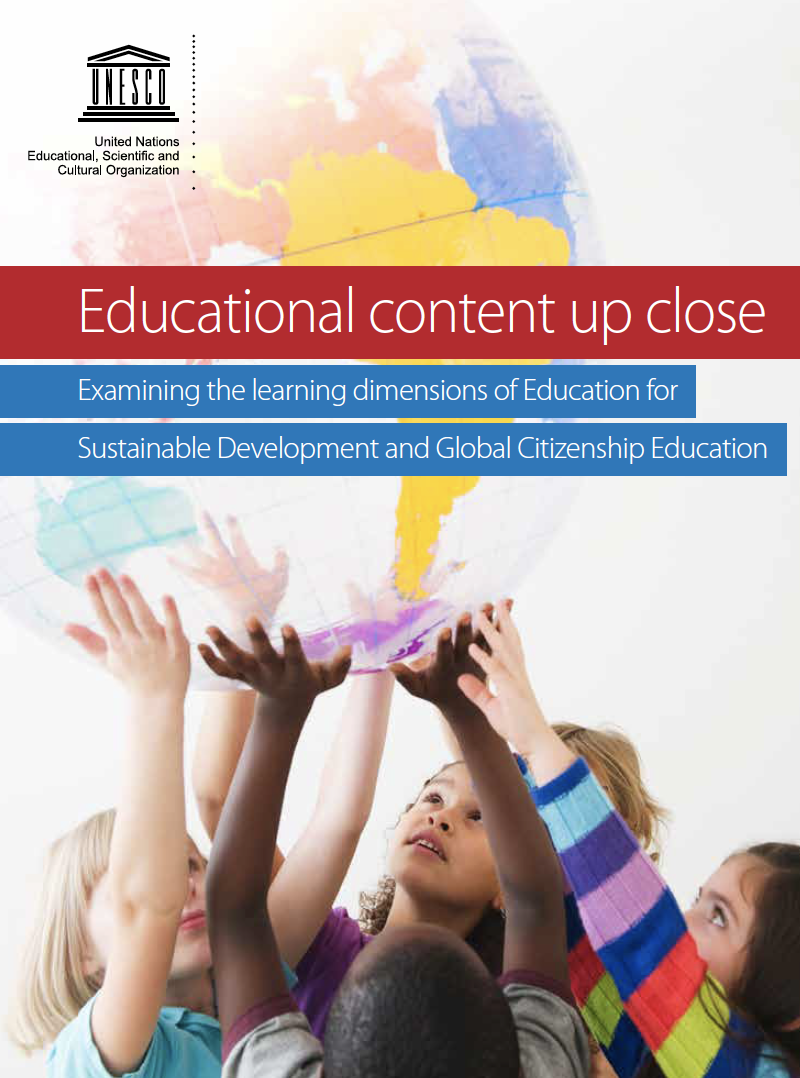
Webinar #9: Integrating Cognitive, Social and Emotional, and Behavioural Learning in Education for Sustainability: Insights from comparative research
This presentation summarizes key findings from a recent UNESCO report I coauthored entitled “Educational content up close: Examining the learning dimensions of Education for Sustainable Development and Global Citizenship Education.” The report explores whether, and to what extent, the three learning dimensions -- cognitive, social and emotional and behavioral -- are prioritized in commitments to ESD (and GCED) at different education levels in a diverse selection of ten countries. Drawing on the study’s analyses, the presentation discusses which contexts and conditions are more conducive to an integrated approach to the teaching of education for sustainability.
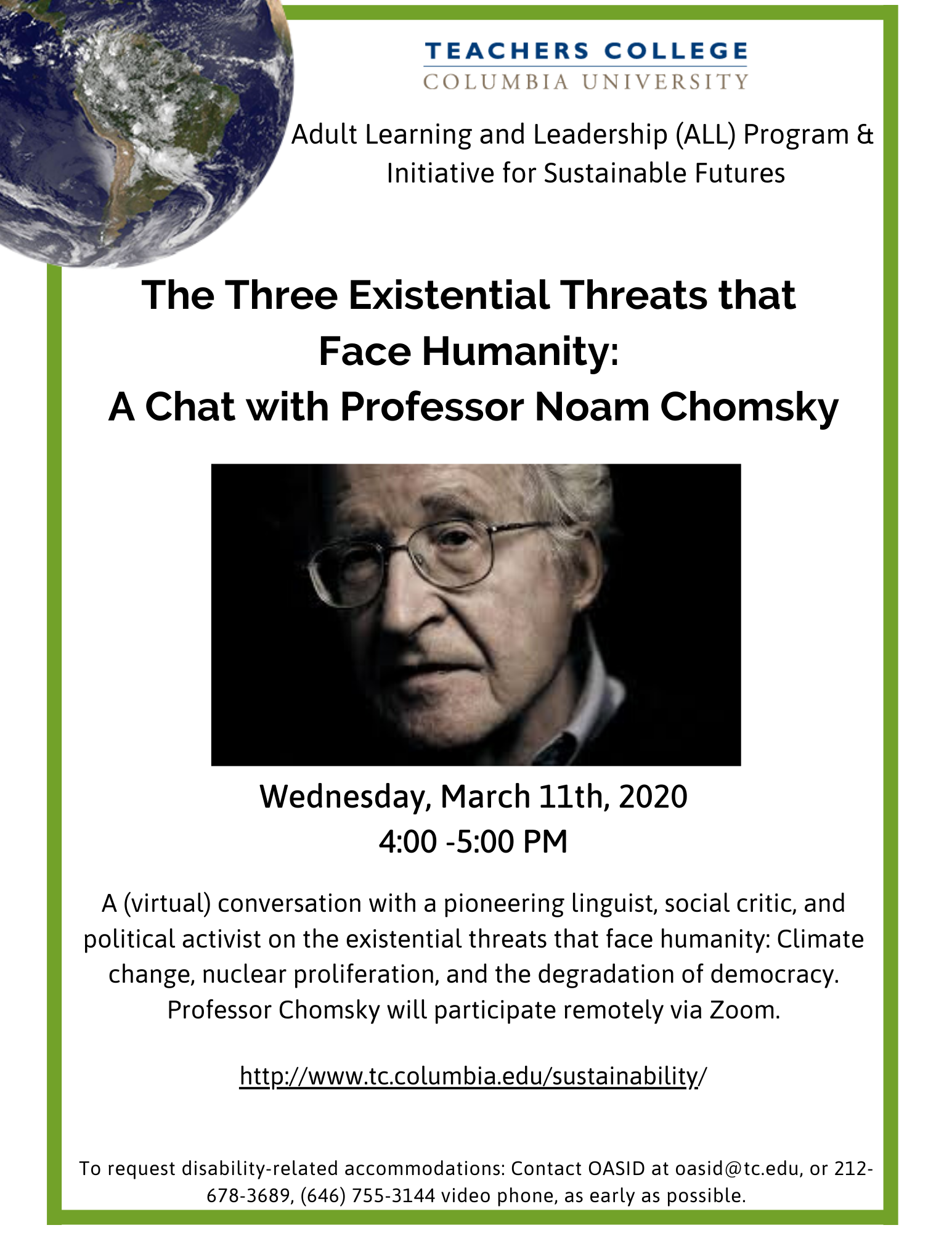
Webinar #8: The Three Existential Threats that Face Humanity: A Chat with Professor Noam Chomsky
In this webinar, Professor Noam Chomsky (Massachusetts Institute of Technology) discusses the existential threats that face humanity: Climate change, nuclear proliferation, and the degradation of democracy. Join the inspiring conversation to learn about the connections between these threats and ways to address them.
Webinar: The Three Existential Threats that Face Humanity: A Chat with Professor Noam Chomsky

Webinar #7: Exploring Snow in Citizen Science Projects to Learn about Climate Change and Microplastics
Discover how to use snow to measure and explore the impact of climate change and microplastics. Join our guest panelists Patrick Alexander and Laurel Zaima from the Lamont Doherty Earth Observatory to learn about the X-Snow and PlastiX-Snow Citizen Science Projects. Find out how to guide K-12 and undergraduate students in taking measurements in the field to unlock the secrets in the snow.
Webinar: Exploring Snow in Citizen Science Projects
Presentation: Presentation Exploring Snow in Citizen Science Projects to Learn about Climate C
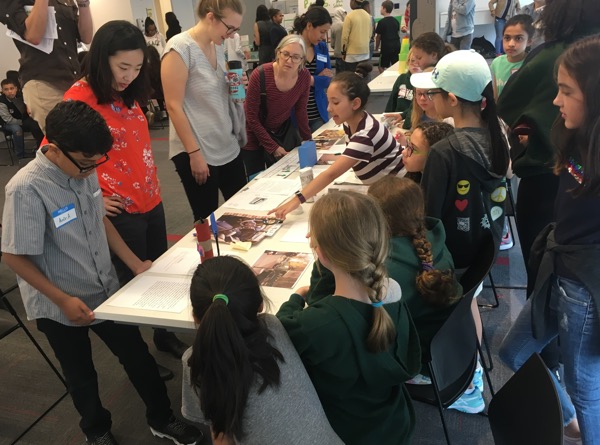
Webinar #6: Engaging students in citizen science: Guiding Inquiry to action
Discover how middle school students became environmental health researchers, to collect and analyze air quality data in their communities using AirBeam technology. CELF staff and NYC teacher Alma Padilla will share how students engaged in a Citizen Science project taking their inquiries and turning them into Action. Using the data, students identified sources of air pollution, understand connections to human behaviors, developed prevention and remediation plans for their communities, and shared their findings with peers and policymakers.
Webinar: Engaging students in citizen science: Guiding Inquiry to action
Presentation: Engaging students in citizen science Presentation

Webinar #5: Food Matters: Teaching Ecological Sustainability Through What We Eat
In this webinar, Pam Koch, Research Associate Professor and Executive Director of the Laurie M. Tisch Center of Food, Education, Program in Nutrition Teachers College, Columbia University and Meredith Hill, Assistant Principal and Garden Coordinator, Columbia Secondary School for Math, Science, and Engineering will provide clear, practical, and fun examples for how school gardens, teaching food system sustainability across the curriculum and using school lunch as a learning laboratory inspire students to adopt sustainable practices in and out of school. Pam and Meredith will also be joined by Debi Slatkin, co-director of the Teachers College Initiative for Sustainable Futures, who will offer food for thought to widen our notion of sustainability and discuss ways to connect with nature.
Webinar: Food Matters: Teaching Ecological Sustainability Through What We Eat
Presentation: Food Matters: Teaching Ecological Sustainability Through What We Eat PowerPoint
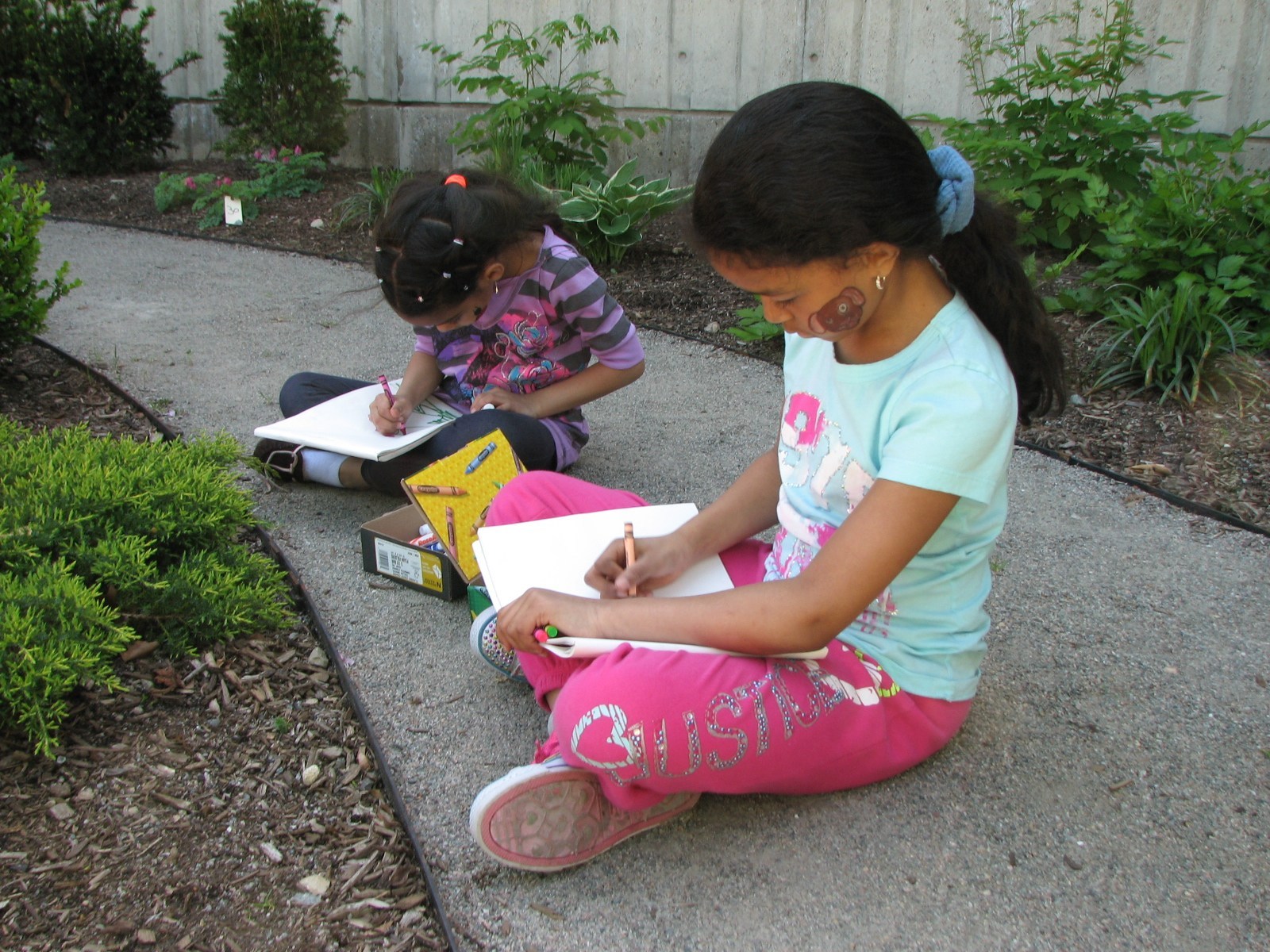
Webinar #4: School Climate and Student Learning: Thinking Outside the Box
In this webinar, Sonali Rajan (Assistant Professor of Health Education at Teachers College, Columbia University) will provide an overview of critical environmental health issues and their corresponding impact on schools and youth well-being. She will speak specifically to the physical and socio-emotional aspects of a school’s climate and the ways in which NYC school teachers are drawing on school climate research to inform practice. She is joined by Paul Clarke who is the Vito Marcantonio Peace Garden coordinator and the nominal sustainability coordinator at CPE2, and Shakira Provasoli, an environmental science teacher and sustainability coordinator at PS 333.
Webinar: School Climate and Student Learning: Thinking Outside the Box
Presentation: School Climate and Student Learning: Thinking Outside the Box

Webinar #3: Educators Creating a Climate for Change
Climate change is a complicated and frightening topic. Schools can help with solve climate change by educating students and parents, and by taking concrete steps to reduce our negative impact on the planet.
Webinar: Educators Creating a Climate for Change
Presentation: Educators Creating a Climate for Change Presentation
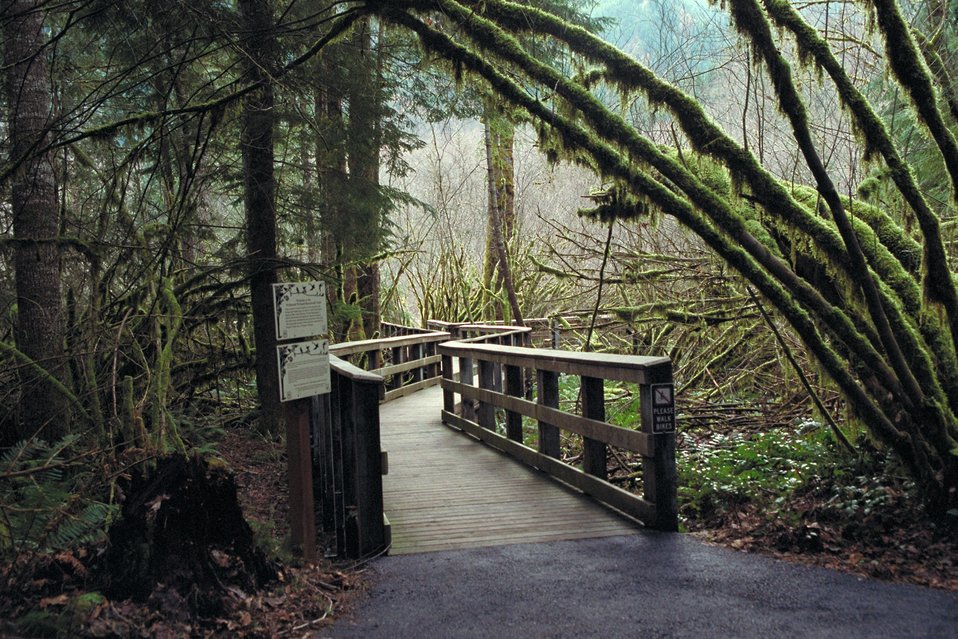
Webinar #2: An Introduction to Sustainability Education
The webinar provides a short overview of environmental and sustainability education (ESE).
Webinar: An Introduction to Sustainability Education
Presentation: An Introduction to Sustainability PowerPoint
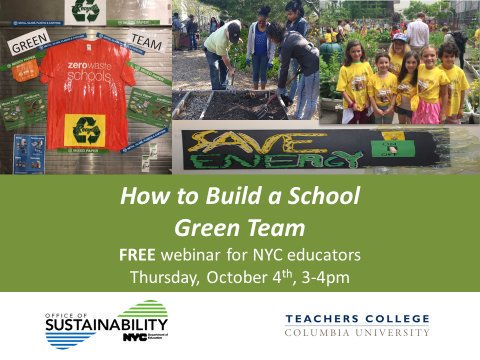
Webinar #1: How to Build a School Green Team
Green teams bring together students, staff and/or community members dedicated to school sustainability through advocacy, awareness and action. More than half (55%) of NYC public schools have a green team. Facilitators discussed the benefits of green teams for students and for the school community as a whole. The webinar also presented tips for engaging students and staff, and ways to overcome challenges and find realistic approaches to implementing sustainability through a green team.
Webinar: How to Build a School Green Team
Presentation: Building a Green Team PowerPoint
Thinking Global, Educating Local - Background
Similar to other global cities, NYC has initiated a groundbreaking effort to address the City’s long-term challenge of climate change. Under this initiative, all City agencies must make progress on 29 sustainability indicators by 2030, including recycling, waste diversion, greenhouse emissions, water conservation, and energy efficiency. The initiative affected schools in various ways, specifically through the publication of Chancellor’s Regulation A-850 on sustainability in 2009. The Chancellor’s Regulation requires all schools to appoint Sustainability Coordinators. In the 2017/2018 academic year, there were close to 1,400 Sustainability Coordinators in NYC.
The TC Initiative for Sustainable Futures is collaborating with the NYC Department of Education Office of Sustainability to improve the ways in which schools engage their communities with sustainability issues. Our recent research identified the need for web-based professional development for educators in general and Sustainability Coordinators more specifically. In the 2017/2018 academic year, only 26% of Coordinators participated in any NYC DOE training on sustainability. Majority of Coordinators explained that travel time and the need to find a substitute are the main barriers. However, two-thirds (66%) of Coordinators indicated they are interested in online training.
Webinar #2: An Introduction to Sustainability Education
The webinar provides a short overview of environmental and sustainability education (ESE).
Webinar #1: How to Build a School Green Team
Green teams bring together students, staff and/or community members dedicated to school sustainability through advocacy, awareness and action. More than half (55%) of NYC public schools have a green team. Facilitators discussed the benefits of green teams for students and for the school community as a whole. The webinar also presented tips for engaging students and staff, and ways to overcome challenges and find realistic approaches to implementing sustainability through a green team.
Presentation: Building a Green Team
Webinar #1: How to Build a School Green Team
Green teams bring together students, staff and/or community members dedicated to school sustainability through advocacy, awareness and action. More than half (55%) of NYC public schools have a green team. Facilitators discussed the benefits of green teams for students and for the school community as a whole. The webinar also presented tips for engaging students and staff, and ways to overcome challenges and find realistic approaches to implementing sustainability through a green team.
Presentation: Building a Green Team